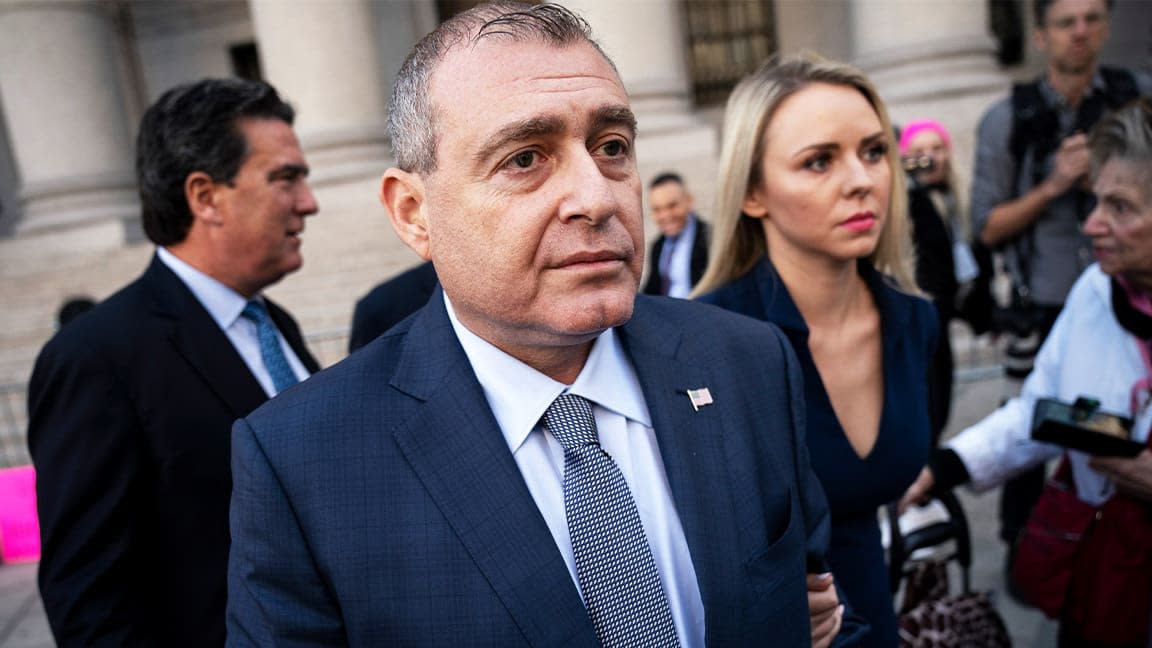How Spotify and Uber Eats Could Boost the Criminal Case Against Giuliani’s Henchmen

Grocery shopping, Uber Eats, a Spotify subscription, and a six-figure donation to the Trump reelection campaign’s official super PAC were among the expenses incurred by a Rudy Giuliani crony at the center of the impeachment inquiry into the president last spring.
The purchases, from the mundane to the very large and political, go to the heart of the criminal case against the men Giuliani enlisted in his effort to dig up dirt on Trump’s political opponents in Ukraine.
Financial records inadvertently released in a civil court case in Florida on Monday provide a complete six-day snapshot of payments from a company called Aaron Investments I, LLC, last year. That’s the company that federal prosecutors say the Soviet-born businessmen Lev Parnas and Igor Fruman used to funnel hundreds of thousands of dollars into Republican campaigns and political groups.
The records reveal some previously reported expenses by the Parnas-owned company, including its $325,000 donation to America First Action, the pro-Trump group, and a $490,000 wire transfer a day earlier to F.D. Import & Export Ltd., Fruman’s Ukraine-based company. They also include a line item for the $1.2 million that the company received from a Miami-area condo sale two days before its America First donation.
Records detailing those purchases were filed in a federal court in Florida on Monday. The records were redacted, but in a way that allowed the blocks of black ink to be easily removed with a standard document editing program. Unredacted, the filing provides a full glimpse of Aaron Investments transactions from May 11 to May 17 of last year.
BuzzFeed News previously reported on financial records of “accounts controlled by” Parnas and Fruman, which showed that they were living lavishly amid their ascendance as high-dollar Republican donors. The records released this week are relevant for the more mundane, everyday expenses they reveal.
In the six days that those records cover, Aaron Investments paid for groceries at a Publix in Boca Raton. The company was billed for a subscription to the popular music streaming service Spotify and an Uber Eats order. Its debit card was charged at a gas station, a Target, a 7-Eleven, a couple pharmacies, and even at the South Florida Science Center and Aquarium in West Palm Beach.
On their own, those expenses would be unremarkable. But Parnas’ current legal predicament could make them far more problematic.
The criminal case against Parnas is based largely on allegations from the Department of Justice that Aaron Investments and other Parnas-affiliated companies acted as his illicit alter egos. The companies, the feds say, were effectively shells used to hide Parnas’ and Fruman’s identities as they poured money into American political contests.
Parnas and Fruman have long maintained that their companies—including Global Energy Producers, the firm listed, apparently erroneously, as the donor to America First—were legitimate entities conducting bona fide business.
To the extent that Parnas was using Aaron Investment for personal expenses, that’s a much harder case to make.
Tony Andre is an Aventura attorney representing Michael Pues, a former Parnas business associate who successfully sued him in 2011 over a $350,000 in a movie deal that went bad. Andre filed the new financial records in court this week as part of Pues’ lawsuit to recoup that judgment, which has since swelled to more than $500,000 with interest.
According to Andre, Parnas’ financial records show that Aaron Investments was indeed Parnas’ alter ego. “During the course of collection proceedings, thousands of pages of bank of records have demonstrated, that...Aaron Investments’ sole purpose is to hold personal bank accounts for the personal and familial use of LEV PARNAS,” Andre told the court on Monday.
Parnas’ attorney did not immediately respond to a request for comment.
The Justice Department has alleged that Parnas routed his political contributions through Aaron Investments and Global Energy Producers to evade campaign contribution limits and hide their identities from election regulators and the public. But DOJ claims he had another motive as well: “to hide from creditors the fact that they had access to funding.”
Pues is currently the largest such creditor, and has tried for years to recoup the money a federal court awarded him in 2013, without success. Placing assets under the ostensible control of a separate legal entity, DOJ alleges, was part of an effort to prevent Pues and others from coming after those assets.
The criminal case against Parnas and Fruman was largely built on information that has emerged in the course of Pues’ litigation against the former. And this month, Andre began pursuing an audacious plan to recoup his client’s money: He’s going after Parnas’ bail.
Got a tip? Send it to The Daily Beast here
Get our top stories in your inbox every day. Sign up now!
Daily Beast Membership: Beast Inside goes deeper on the stories that matter to you. Learn more.

